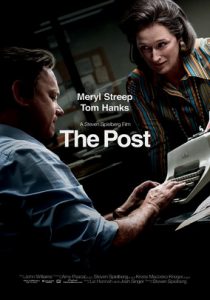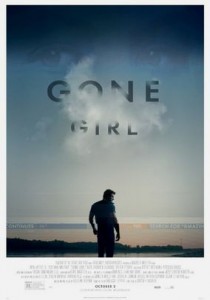The Post-2017
Director Steven Spielberg
Starring Meryl Streep, Tom Hanks
Scott’s Review #715
Reviewed January 15, 2018
Grade: A-
Amid the current political upheaval in the 2017 United States, comes a fresh and timely film named The Post, created by esteemed director Steven Spielberg and starring two of today’s biggest Hollywood film stars: Tom Hanks and Meryl Streep.
The film is a political, historical thriller set during the tumultuous year 1971, as the controversial Vietnam War raged on. It tells of the bravery of a female newspaper owner (Streep) who risked everything to publish the truth with her team of mostly male editors and staff.
The film is an intelligent piece of writing.
Its crisp script and quick editing allow for a believable foray into a different time, when newspapers were hot and rotary telephones, telephone booths, and polyester outfits were all the rage.
Spielberg is brilliant at setting just the right mood and tone to transport the audience back to 1971, on the eve of the enormous Watergate scandal.
While all of the elements are in play, and the truthful story is important, the film is very good but not quite brilliant—it falls just shy of that bombastic one or two scenes that would land it over the top.
The Post begins in the jungles of Vietnam in 1965, as military analyst Daniel Ellsberg documents the progress of military activities among the soldiers during battle.
On the journey home, he briefs then-President Lyndon Johnson that the war is hopeless and should be stopped. As history unfortunately shows, the brutal war continued with thousands of lives lost.
The film then continues on a journey of uncovering top-secret Pentagon papers documenting the White House’s knowledge of the war’s useless nature. Each administration chose to continue with the bleeding to avoid the United States being “humiliated.”
Streep gives her best performance in years as Katharine Graham, the Washington Post newspaper heiress, a woman who struggles to be taken seriously in a man’s world, especially given the period, many men were uncomfortable taking direction from a woman.
Streep infuses the role with the perfect amount of emotion, insecurity, and charm. Despite her wealth and control, she is frequently overruled by the all-male board of directors, so much so that she often doubts her confidence.
Hanks, however, underwhelms as the gruff editor-in-chief of the Post, Ben Bradlee. Given the actor’s enormous talents, I was expecting a meatier performance, which does not materialize.
I also anticipated an equal balance of Hanks and Streep, but the film belongs to Streep.
Perhaps because Hanks (the ultimate nice guy) portrays Bradlee as a challenging, yet family man, the performance does not quite work.
Also, the chemistry between Hanks and Streep is not the specialty of the film.
Evident is the correlation between 1971’s President Nixon and 2017’s President Trump—both administrations were shrouded in controversy.
A neat trick Spielberg creates is to only show Nixon in shadows, wildly gesturing and threatening, similar to Trump’s mannerisms—this is no accident.
The entire work of The Post seems to be a big call-out by Spielberg, a devout liberal, to the Trump administration.
This comparison of past and present makes The Post incredibly timely and topical for 2017.
Clever is the intriguing ending—as the Watergate scandal begins with a security guard catching intruders at the complex, Spielberg seems to be saying, “Watch out, Trump!”
In 2017, the current state of the media versus the White House has never been more controversial, disdainful, and even hateful, as the “truth” is often tough to come by or even to distinguish.
“Fake news” is now a thing and Twitter rants are now a daily occurrence, making the “truth” a precious commodity.
For this reason alone, The Post (2017) must be a film we celebrate and model ourselves after—how timely indeed.
Oscar Nominations: Best Picture, Best Actress-Meryl Streep

